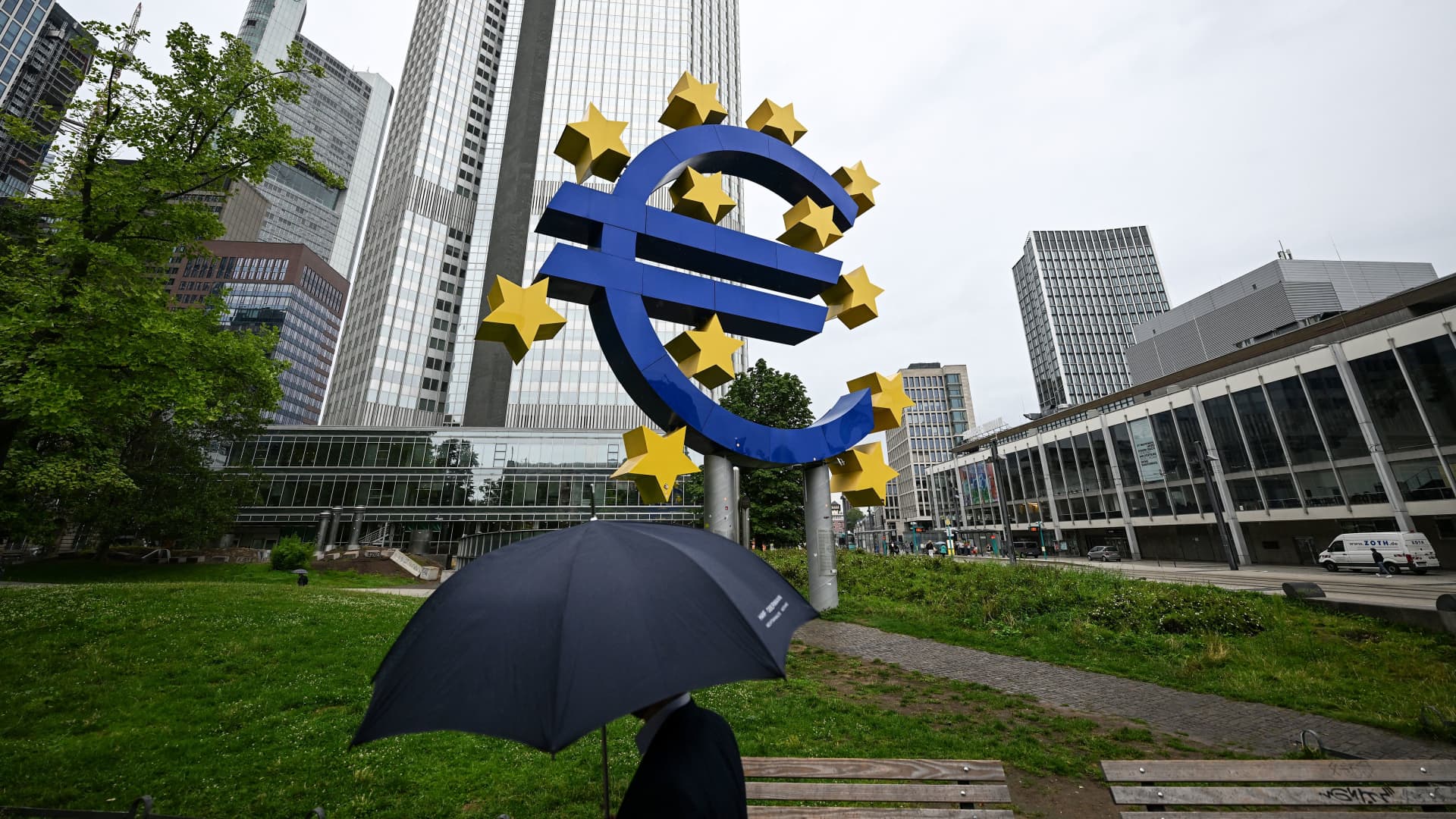A man shelters from the rain under an umbrella as he walks past the Euro currency sign in front of the former European Central Bank (ECB) building in Frankfurt am Main, western Germany.
Kirill Kudryavtsev | Afp | Getty Images
European banking’s latest takeover battle is widely regarded as a potential turning point for the region — particularly the bloc’s incomplete banking union.
Italy’s UniCredit has ratcheted up the pressure on Frankfurt-based Commerzbank in recent weeks as it seeks to become the biggest investor in Germany’s second-largest lender with a 21% stake.
The Milan-based bank, which took a 9% stake in Commerzbank earlier this month, appears to have caught German authorities off guard with the potential multibillion-euro merger.
“The long-discussed move by UniCredit, Italy’s number one bank, to seek control of Germany’s Commerzbank is a watershed for Germany and Europe,” David Marsh, chairman of London-based OMFIF, an organization that tracks central banking and economic policy, said Tuesday in a written commentary.
Whatever the outcome of UniCredit’s swoop on Commerzbank, Marsh said the episode marks “another huge test” for German Chancellor Olaf Scholz.
The embattled German leader is firmly opposed to the apparent takeover attempt and has reportedly described UniCredit’s move as an “unfriendly” and “hostile” attack.
“The dispute between Germany and Italy over UniCredit’s takeover manoeuvres – branded by Scholz an unfriendly act – threatens to inflame relations between two of the Big Three member states of the European Union,” Marsh said.
“A compromise could still be found,” he continued. “But the hostility developing in Italy and Germany could scupper any meaningful steps towards completing banking union and capital markets integration, which all sides say is necessary to drag Europe out of its malaise.”
What is Europe’s banking union?
Designed in the wake of the 2008 global financial crisis, the European Union’s executive arm in 2012 announced plans to create a banking union to make sure that lenders across the region were stronger and better supervised.
The project, which became a reality in 2014 when the European Central Bank assumed its role as a banking supervisor, is widely considered to be incomplete. For instance, the lack of a European deposit insurance scheme (EDIS) is one of a number of factors that has been cited as a barrier to progress.
European leaders, including Germany’s Scholz, have repeatedly called for greater integration in Europe’s banking sector.
OMFIF’s Marsh said Germany’s opposition to UniCredit’s move on Commerzbank means Berlin “now stands accused of favouring European banking integration only on its own terms.”
A spokesperson for Germany’s government did not immediately respond when contacted by CNBC for comment.
The logo of German bank Commerzbank seen on a branch office near The Commerzbank Tower in Frankfurt.
Daniel Roland | Afp | Getty Images
Hostile takeover bids are not common in the European banking sector, although Spanish bank BBVA shocked markets in May when it launched an all-share takeover offer for domestic rival Banco Sabadell.
The head of Banco Sabadell said earlier this month that it is highly unlikely BBVA will succeed with its multi-billion-euro hostile bid, Reuters reported. And yet, BBVA CEO Onur Genç told CNBC on Wednesday that the takeover was “moving according to plan.”
Spanish authorities, which have the power to block any merger or acquisition of a bank, have voiced their opposition to BBVA’s hostile takeover bid, citing potentially harmful effects on the county’s financial system.
Mario Centeno, a member of the European Central Bank’s Governing Council, told CNBC’s “Street Signs Europe” on Tuesday that European policymakers have been working for more than a decade to establish a “true banking union” — and continue to do so.
The unfinished project means that the intervention framework for banking crises continues to be “an awkward mix” of national and EU authorities and instruments, according to Brussels-based think tank Bruegel.
Asked whether comments opposing banking consolidation from leading politicians in both Germany and Spain were a source of frustration, the ECB’s Centeno replied, “We have been working very hard in Europe to bring [the] banking union to completion. There are still some issues on the table, that we all know.”
What happens next?
Thomas Schweppe, founder of Frankfurt-based advisory firm 7Square and a former Goldman mergers and acquisitions banker, said Germany’s decision — intentional or otherwise — to sell a small 4.5% stake to UniCredit earlier this month meant the bank was now “in play” for a potential takeover.
“I think we are, you know, proposing a European banking landscape and also in Germany, they are a proponent of strong European banks that have a good capital base and are managed well,” Schweppe told CNBC’s “Squawk Box Europe” on Wednesday.
“If we mean this seriously, I think we need to accept that European consolidation also means that a German bank becomes the acquired party,” he added.
Asked for a timeline on how long the UniCredit-Commerzbank saga was likely to drag on, Schweppe said it could run for months, “if not a year or more.” He cited a lengthy regulatory process and the need for talks between all stakeholders to find a “palatable” solution.

 Blog Post7 days ago
Blog Post7 days ago
 Economics1 week ago
Economics1 week ago
 Personal Finance1 week ago
Personal Finance1 week ago
 Finance1 week ago
Finance1 week ago
 Finance1 week ago
Finance1 week ago
 Accounting1 week ago
Accounting1 week ago
 Accounting1 week ago
Accounting1 week ago
 Economics1 week ago
Economics1 week ago











